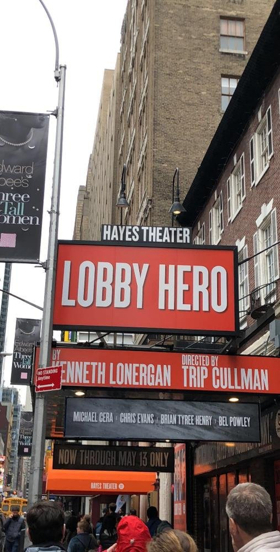BWW Blog: LOBBY HERO on Broadway

Life moves in circles.
This sort of cliche isn't the message of Lobby Hero-rather, the play in itself is emblematic of the spirit of zeitgeist, the kind where unintended artistic choices turn out to be eerily prescient.
This operates on the superficial, humorous level, where Michael Cera and Chris Evans meet again following their original encounter in Scott Pilgrim Vs. The World. They seem to be destined for their roles here-it is as if they are playing slightly more grownup versions of their Scott Pilgrim characters. Even a comedic bit about getting Evans' character's autograph hearkens to a scene in Scott Pilgrim; yet playwright Kenneth Lonergan wrote the script 17 years ago.
Cera is, as Variety puts it, "a lovable loser," a bit mopey, his hands always stuffed in his pockets, his shoulders always hunched over, ridiculously uncomfortable in his own skin. Yet this is what makes his search to contribute something to the world so endearing; who can't relate to his character Jeff wanting to do more, as a security guard to an apartment complex constantly mistook for a "doorman?" Like Scott Pilgrim, Jeff is hopelessly in love with a girl out of his league, and like Scott Pilgrim, he learns to stand up for himself against Evans in unconventional ways.
Evans plays a character that we love to hate. Like Scott Pilgrim's Lucas Lee, Bill in Lobby Hero oozes charm, confidence, and crookedness all at once. It's a stark departure from Evans' squeaky clean, righteous Captain America-in fact, Bill is the most morally manipulative out of our four imperfect characters. The play swivels between moments of truth and hypocrisy backtoback, but in one scene Evans plays up his appeal so convincingly that the audience along with his scene partner nearly believe him, even after he revealed his murky intentions. But that shallow allure and sweettalk crumbles as the play goes on, much to the audience's delight (audible in the cheers and claps as Bill's patrol partner Dawn, played by Bel Powley, takes him down with verbal barbs and righteously indignant body language).
So life has moved in circles in the casting department. But more importantly, the fact that Lonergan's play is even more relevant today than it was 17 years ago should be taken as a warning and a wakeup call. Perhaps we have made progress in recognizing these issues for what they are-#metoo, police brutality, racial profiling, broken legal system-but these problems are still largely unsolved, judging by the audience's sharp intake of breath at certain points in the play. Lonergan doesn't try to offer an answer-in fact, the last scene offers only a subtle character resolution and not a moral one-but he paints his working class characters with strokes of empathy and nuance.
Maybe that is the answer: that there is no answer. In the course of the play, a gruesome rape and murder occurs, a chance encounter leads to police brutality, false alibis are formed and problematic issues are swept under the rug. All violence takes place offstage; we are only informed of it through these characters. We are getting our facts and figures secondhand, and we must constantly remind ourselves that ultimately, we don't know the truth. And perhaps we never will. We watch these characters scramble to live with the choices they make in the circumstances they didn't get to choose. Just like Jeff admires the other characters, so do we because we know their hearts. Variety notes, "the irony is that everyone compromises their moral principles not out of evil motives, but out of love, generosity, and loyalty," even Bill when viewed in a certain light.
Perhaps what shook me most was that nobody, not even Cera's character, escapes the play morally free from the tangle of ethics Logernan writes. The misdeed that Jeff commits towards the end of the play-summed up in one response to a pointblank question asked by his supervisor William (Brian Tyree Henry)-is so small in comparison to the crimes that have transpired over the course of the play, and yet many people in the audience gasped. This was a betrayal of the very morals he had espoused beforehand, and what we interpreted as a betrayal of the self. This is ironic, coming from someone who so desperately wants to make an impact on the world-how can he change the world if he doesn't even know himself?
Life moves in circles. I can't make heads or tails out of the "right thing to do" in Lonergan's play. It's the Kantian idea of universal maxims against Humean concept of subjective moral sentiments. Ethics in this play is indeed circular-I start to untangle this morality mess and I end where I began. I believe that is what Lonergan intended. With Chris Evans' presence reminding us of what a traditional superhero looks like, it's clear that these "lobby heroes" desperately fall short of that standard. And yet, lovable loser Jeff, spunky Dawn, and conflicted, worn-out William are heroes in their own right. Maybe that's what heroes are: people unwilling to give up the good fight.
Comments
Videos


